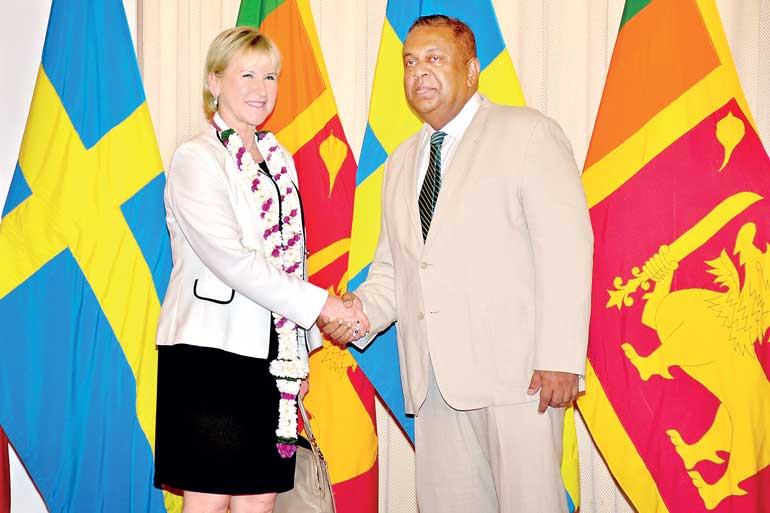Thursday Feb 19, 2026
Thursday Feb 19, 2026
Friday, 29 April 2016 00:00 - - {{hitsCtrl.values.hits}}
 THE WRITING IS ON THE WALLSTRÖM: Sri Lanka is looking increasingly like the prettiest girl on the beach in this region. Here, Sri Lankan Foreign Minister Mangala Samaraweera and his Swedish counterpart Margot Wallström parley about the island-nation’s European prospects – especially the Holy Grail of GSP Plus concessions
THE WRITING IS ON THE WALLSTRÖM: Sri Lanka is looking increasingly like the prettiest girl on the beach in this region. Here, Sri Lankan Foreign Minister Mangala Samaraweera and his Swedish counterpart Margot Wallström parley about the island-nation’s European prospects – especially the Holy Grail of GSP Plus concessions
Call me a suspicious old journalist, but something’s going on in the region. The global press is too agog about sunshine stories on our debt-ridden, drought-overcast island.
Sri Lanka has been the ripe mango of our neighbours’ ^lust of the eyes^ since time out of mind. Indian imperialism – both religious-political, as well as commercial and socio-cultural – has looked south since philosopher-kings such as Asoka, as much as horse-trading invaders like Sena and Guttika. China, historically, may have invested spiritually in our teardrop island from long before, given a mystic association between Cathay’s well-being and Ceylon’s welfare. Embassies have been entertained over time: from classical Greece, republican Rome and its subsequent burgeoning empire, Persia, Portugal, and a plethora of other suitors (also known as colonists or conquistadores) from pre-deterministic Dutchmen to prim and proper Brits. 
A variety of values and assets has shaped our destiny – from the putative blessing Ceylon was, is, will be, to China; to being the prettiest girl on the beach vis-à-vis German package tourism. We are also the proud possessors of enviable hard infrastructure – strategic Indian Ocean shipping-lane-straddling location, superb deep-water ports, relatively good access via road and rail from littoral to hinterland – that make us attractive to virtual and real-world empires, from superpowers to superbrands.
That regional aspirants to superpower status are presently scrapping for favour of this island-girl’s attention, is a global legend that western media are happy to create, and promulgate, and watch from afar – for now. Sri Lanka is no innocent party, so to speak, desperately seeking foreign investment as much as a luscious slice of markets and commerce or trade opportunities.
Thus a flurry of recent theses among world-watchers to the effect that India and China are tussling for an edge in their influence over Colombo’s governmental policymakers? And the attendant argument that as regards cosying up to China while indicating to India that our ballroom card isn’t fully filled up, Sri Lanka’s leading political figures are dancing on thin ice. But stepping pretty nimbly for a pair of professional politicians in their first amateur tandem championship!
The fast track
In this respect, two heads are better than one. It makes duplicity in international courts seem like diplomacy of the first water, and it makes volte-faces at home as regards pre-election manifestos appear pragmatic or even prudently desirable. The Colombo Port City Development Project is a case in point.
When in opposition, the Common Candidate’s promise was to scrap the Rajapaksa regime’s flagship development operation on the grounds of alleged tender irregularities and potential damage to Colombo’s south-western coastline. Once in power (to be fair, a year or so had to pass for reality to sink in with a sinking feeling), the Coalition Government had to go back on its word, and go back to China with hat in hand and with a $ 125 million demurrage payment also in hand – being the due penalty for delays in agreements between sovereign governments.
That Prime Minister Ranil Wickremesinghe’s visit to China this month – for this and other purposes such as mending fences, seeking better terms for the project, and negotiating an equity swap against our country’s $ 8 billion worth of Chinese loans – is hailed as a master-class in foreign policy coups is to his credit; and to the shame of the swashbuckling Rajapaksa regime that put Sri Lanka in this plight in the first place.
Of course, the Prime Minister has not acted, nor can he act, unilaterally in a climate of cynical political cohabitation. Long before the Premier took the silk route back to China’s overflowing coffers, President Maithripala Sirisena had made it a point to visit our northerly neighbour India as part of his first visits overseas. The gratified Indian leader returned the gesture handsomely with an unexpectedly prompt reciprocal visit. On top of the mutual gestures of goodwill came a gravy train of aids and helps – for railway projects, oil-tank farms, coal power plants, and perhaps more importantly a $ 1.5 billion currency swap.
Maybe this is as much Sri Lanka’s enlightened self-interest qua Asia’s third-largest economy (and a market that dwarfs ours by dint of being ten times larger) being separated from us by nothing more daunting that a strip of shallow sea. As much as it is India’s recognition of Sri Lanka’s increasingly strategic location along China’s vaunted ‘Maritime Silk Road’ from Eastern Asia to Africa’s East Coast.
The road to dusty death
Therein lies the rub. There is no getting away from Sri Lanka’s ‘central’, ‘strategic’, ‘logistical’ #location, #location, #location. There is also no denying, displacing, projecting, sublimating, or reacting in transference to the advances of two equally ardent if diversely amorous suitors. One must admit and accept that it is not our virtue alone that warrants being courted. A large part of the suit is the precious pearl’s proximity to oceanic superhighways that flow due south of our island – a rich stream of crude oil (an estimated 66% of total global volumes) and container transhipments (around 50% of world totals), carried by an argosy of magic sails (some 60,000 ships, annually).
In the absence of a US or NATO or any other Western military base on the isle, it might seem to power- and control-hungry regional superpowers with eyes on us that Sri Lanka is up for grabs – with interest in, and investment in, and influence over, the island-nation’s destiny being a surrogate for a purely military presence.
Small fish in a big pond no longer where size alone matters less than strategic significance, Sri Lanka is poised on the cusp of the Asian continent’s ascendancy in world affairs. That our two heads – and a panoply of non-aligned leaders before them (save one, arguably, and may God rest him in his enforced retirement) – have done well to safeguard and retain our island’s sovereignty is no reassuring laurel to rest on.
Caught between sovereign suitors pressing their case, the prettiest girl on the beach has to look beyond virginal reliance on coyly manoeuvring between wooing and being wooed in return. Perhaps a sly glance at rival regional superpower-aspirants (such as Japan on the rise, simultaneously with ancient arch-rival China) or a show of leg to liberal democracies west of Asia’s westernmost borders might not be untimely or unsporting – and our Foreign Minister’s reported sweetening of his visiting Swedish opp.-no. might be just the reassuring indications that Sri Lanka knows the writing is on the wall.
Even the ranks of Tuscany in the international courts of diplomacy cannot fault a tiny island-nation for safeguarding her virtue and her wealth. Let him who is without promiscuous intentions or profligate investments in Trojan horses cast the first stone.
The bottom line
Just being neighbourly in a nosey sort of way, is India. And quite naturally concerned about security in its home waters. China maybe the same... in a more distant, if spiritual, or simply big-brotherly way. But this is a sublimely naive perspective for many if not most observers. No self-respecting nation since the Westphalian synthesis of 1648 has ever acted entirely out of such altruistic motives.
Some *hermeneutic of suspicion* lenses
A few, if some, will dismiss these fears as idle minds being paranoid. But, as a past-master of diplomacy (Dr. Henry Kissinger) once said: “Just because you’re paranoid it doesn’t mean that someone’s NOT out to get you.”
PRAGMATIC/NECESSARY: Political motivations rule the roost (e.g. inconvenient ethnically loaded electorates in one’s topological south, as for India).
CYNICAL/STRATEGIC: Military possibilities open up new space for expedient exploration and encroachment (viz. China’s >String of Pearls strategy to encircle the subcontinent with a battery of bases offshore, from Africa’s eastern seaboard to Bangladesh).
SUBVERSIVE: The real prize is Sri Lanka’s plentiful aquifers and un-diminishing fresh water resources. See this space for that story, as it develops over the next decade.